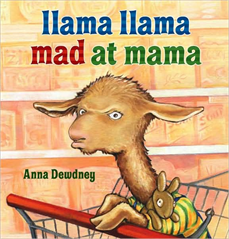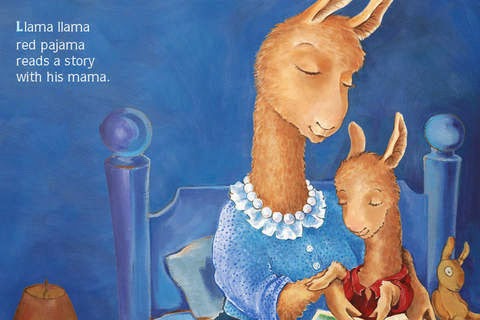I don't think I can stress this enough, but as someone who has read oh so many children's books aloud to ungrateful little snotbag audiences (by which I mean that I love and cherish children always), I have strong opinions about rhyming patterns in those stories.
For example, stories that don't rhyme at all? That's totally okay. You have decided not to do this, and while you have therefore made my life less fun and wacky for the next ten minutes or so, I can respect your choice. You know your own limits and that is definitely all right.
Stories that do rhyme? Tricky. Because here's the thing: rhyming is a lot harder to pull off that we all collectively seem to think it is. But just ask someone to come up with a limerick on the fly or rap or to generally rhyme even the most basic construct, and they'll fail miserably. Now ask them to make an entire story out of rhymes. That makes sense. And is engaging and fun for children. And doesn't use any swears.
It's so hard!
Which is why I really do respect the authors who can wield a rhyme and tell a good engaging story while they do it. Today's example of that is Anna Dewdney, whose Llama Llama books are one of the few series I can read to the Munchkin over and over again without wanting to scream. Which is high praise, trust me.
Her books, which all started out with the absolutely adorable Llama Llama Red Pajama, follow the adventures of baby Llama, child of the imaginatively named Llama family. There's Mama Llama and probably a Daddy Llama but he doesn't come up much. He has a friend named Nelly Gnu and sometimes he goes to preschool. But mostly, little Llama plays with his toys and goes to the store with mama or stays home sick, or in some way interacts with the world. And inevitably, something doesn't go Llama's way, because he's a toddler, so he throws a fit.
That's when Mama Llama tells him to stop all this llama drama! She says it like once a book at least. And then she calmly explains to him what appropriate behavior is, and he's a good little llama and understands, and then there's a happy ending and everyone loves everyone else the end.
Okay, and I can kind of see why some people might not think I love these books, because they are very simple and moralistic, but they're also good. Like, they're fun to read and the morals are all things I can totally get behind. The moral of Llama Llama Red Pajama is that sometimes you just have to be patient. It's about Llama trying to go to bed and he decides he's scared and he needs Mama right away, but Mama is busy and so he throws a tantrum. And it's super simple, but the message is that Llama just needs to calm the hell down because Mama's still here even when she's downstairs, and sometimes you just have to wait.
I can appreciate that, and not just for the selfish fact that my life would be a lot easier if the Munchkin learned this lesson. It's a good lesson to learn, that while you are important and valued, there are other things that matter too, and sometimes you just have to be patient. Good moral there.
Or what about Llama Llama Mad At Mama? That one is about Mama taking Llama shopping and he throws a fit in the store because it's taking too long. Then Mama tells him to knock it off. The end. Like, that's seriously the whole book, but it's funny and charming and beautifully illustrated, and it rhymes so well, and again, super helpful message. Sometimes we have to do chores. Deal with it. Yes.
But, getting back to the crux of my argument here, the reason these stories are palatable and the reason their morals work so well is because of how they're written. The meter and rhyme of the stories is perfectly calibrated into this kind of lulling sing-song that gets little ears listening without realizing they're being taught a thing. It's genius!
No, seriously. It really is genius. I've read enough badly rhymed books to understand that finding a meter and verse that work for you and for your style, then matching them to the actual mechanics of the story is really incredibly hard. Hats off to Anna Dewdney for managing all of that and then painting the illustrations too. That's a lot of work.
My point here isn't exactly that we should all revere Ms. Dewdney, though. Not quite. More just that it's worth paying attention to the little things, like rhyme, that help get kids' attention. The Munchkin listens a lot better when something is said in a sing-song. He also listens better about getting exercise when I point out that Lightning McQueen likes to go fast and needs to practice before his races. He loves cheetahs and sometimes he pretends one is chasing him. And songs in minor keys make him fall right to sleep. I have no idea why.*
 While it's good to know your kid's specific preferences, it's also good to know why that's the thing that works for him or her. Why do the Llama Llama books work on the Munchkin? Why those books and not the Berenstain Bears or something. Because he does love the Berenstain Bears, but they don't teach him anything. He never refers back to them and their morality, whereas he has, on several occasions, mentioned remembering to share because of how Llama played with Nelly Gnu that one time. Or knowing that I'll always be there for him like Mama Llama is. He's actually learned from these stories, and it's really wonderful.
While it's good to know your kid's specific preferences, it's also good to know why that's the thing that works for him or her. Why do the Llama Llama books work on the Munchkin? Why those books and not the Berenstain Bears or something. Because he does love the Berenstain Bears, but they don't teach him anything. He never refers back to them and their morality, whereas he has, on several occasions, mentioned remembering to share because of how Llama played with Nelly Gnu that one time. Or knowing that I'll always be there for him like Mama Llama is. He's actually learned from these stories, and it's really wonderful.The reason for this is because the books are sticky. It's a term coined by the creators of Sesame Street to refer to how much the intended audience pays attention to a certain piece of media. In the case of that show, they placed kids in front of two monitors, one showing Sesame Street and one showing random images. Then they measured where the kids were looking and designed the show so that you would always look at Sesame Street instead of something else. Which explains so much about my childhood, you have no idea.
But the point here is that the Llama Llama books work because they're incredibly clever and good and fun and also because the rhyming makes them sticky. It makes them hold the attention of a child for a lot longer than another story might, and that gives them much more time to absorb the lessons being taught them. Isn't that awesome?
So I guess this is sort of just a thank you to Anna Dewdney. Thank you, from the bottom of my heart, for writing stories that I can genuinely stand, and for making them the kind of catchy that a three and half year old can't resist. And please, please, please keep writing them so I don't have to go back to the other stuff.
Please.
*I lied. I have some idea why. I think after a year and a half of me singing minor key lullabies to him before naptime I've accidentally preconditioned him to fall asleep to that tune. Which is going to make his adult life hilarious. And since most of the songs I sing to him are in Hebrew, if he ever goes to a Jewish music festival he's screwed.





I grew up on Berenstain Bears and I learned a lot: Dad's are doofs and should be treated like children. Mothers are self-righteous and infallible. Everything has an easy palatable answer if you simply already know it and can instantly apply it flawlessly. And of course, rhyming and rhythm is apparent not for bears because they cannot ever.
ReplyDeleteWith the access to online movies it's now possible that you watch old movies anytime you desire.Source for more about primewire.
ReplyDeleteESCORTS IN KOLKATA
ReplyDeleteVILLAGE CALL GIRLS
VILLAGE CALL GIRL
CALL GIRL
CALL GIRLS
ESCORT
ESCORTS
KOLKATA FEMALE ESCORTS
KOLKATA HOTEL ESCORTS
KOLKATA MODEL ESCORTS
KOLKATA CALL GIRL
KOLKATA CALL GIRL SERVICE
KOLKATA CALL GIRL SERVICE
KOLKATA CALL GIRLS
CALL GIRL
CALL GIRLS
CALL GIRLS SERVICE
CALL GIRL SERVICE
KOLKATA INDEPENDENT CALL GIRLS
KOLKATA INDEPENDENT CALL GIRL
ESCORT
KOLKATA INDEPENDENT MODEL ESCORTS
KOLKATA CALL GIRLS ESCORTS
KOLKATA CHEEP ESCORTS
KOLKATA CALL GIRLS NUMBER ESCORTS
KOLKATA HIGH PROFILE ESCORTS
KOLKATA AIRHOSTESS ESCORTS
KOLKATA PARK HOTEL ESCORTS
KOLKATA PARK HOTEL ESCORT
KOLKATA FIVE STAR ESCORT SERVICE
KOLKATA HOUSEWIFE ESCORT SERVICE
KOLKATA BOUDHI ESCORTS
INDEPENDNET ESCORT IN KOLKATA
KOLKATA ESCORT AGENCY
I would like to be your pen friend...You can write me email on [email protected] for
ReplyDeleteJaipur Escort
Jaipur Escort
Jaipur Escort
Delhi Escort
Guwahati Escort
Guwahati Escort
Guwahati Escort
Guwahati Escort
Lucknow Escort
Aerocity Escort